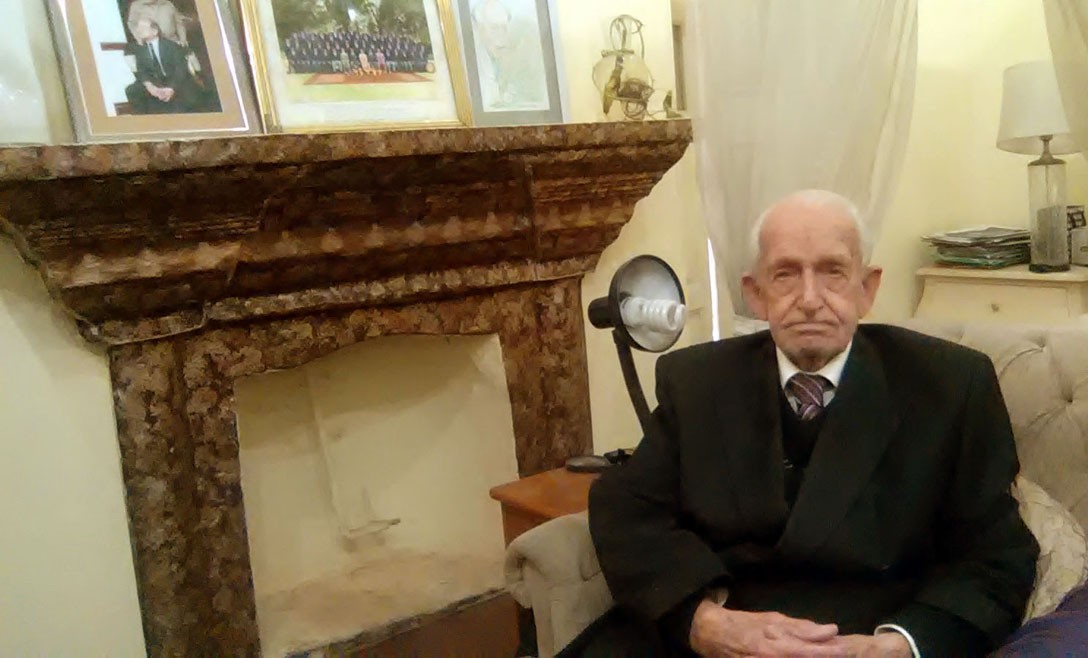
An exclusive meeting with Maj (retd) Geoffrey Douglas Langlands, the nonagenarian man who has served at different educational institutions in Pakistan all his life

He came to Pakistan as a young British commando, around the time of Independence, in 1944, and stayed back to educate the young -- something he was to do for the rest of his life. Major (retd) Geoffrey Douglas Langlands is indeed a distinguished educationist -- a living legend, to use a cliché -- who has witnessed an entire century’s history unfold before him. In October this year, he turns 99.
By his own admission, Langlands is an adventurous person. He served Pakistan Army as a trainer for six years, after 1947, and spent 60 years of his life teaching in a country where education has, unfortunately, never been a priority with the government in the true sense of the word.
He served at three different colleges. Interestingly, he never applied to these colleges; he was approached every time.
His first teaching assignment was at Aitchison College, Lahore, which he took on the request of the then commander-in-chief of the Pakistan Army General Ayub Khan.
Langlands wears a serene smile, as he ushers this scribe in to a tidy but spacious room, done up in old-fashioned style, in his accommodation at Aitchison’s Bahawalpur House.
He confesses to have lived a full life. "I’ve had the time of my life," he says gaily, and goes on to explain how he along with a British engineer friend of his at the University of Engineering & Technology (UET) managed to fly to England from Pakistan on a private jet. His friend had bought the plane for Rs4,000.
"One day he came to me and said, ‘I’m flying to England with my wife.’ I decided to join them. Our flight itinerary spanned over a month’s time, as the jet flew at the speed of 90 miles per hour, stopping over at 28 airports en route."
He recalls how their plane almost had a brush with the overgrown bushes before it touched down at Croydon (where he used to teach mathematics and science to Grade 2nd students in a school before joining the British Army. This was around the time the World War II began, in 1939.)
Giving a precise account of how a policeman and a farmer reacted to the landing, he chuckles, "A Red Cross person came up, rather sorry to find that nobody had been hurt!"
And when was that? "1956!" He was prompt.
In 1947, Langlands got two consecutive contracts -- of three years each -- with Pakistan Army as a trainer when the British pulled out from the Indian subcontinent. "I will stay," was his answer to Gen Ayub Khan when the latter said to him, "We want to keep people like you." Three days later, he had got a teaching job at the country’s top school, Aitchison.
"That was the sort of school I wanted to be in," he says.
The next year he was officiating as headmaster of Aitchison’s Prep School. He taught at the institution for almost 25 years.
"Then they wanted me to be the head of a school for boys who were not recognised as citizens," Langlands says, while narrating his journey to Cadet College Razmak in North Waziristan, FATA, in 1979, that required him to leave a comfortable job behind.
The principal of Aitchison College refused to let him go. It was only after the intervention of the then Governor of NWFP who wrote to the principal of AC that Langlands was allowed to leave.
"I give you two reasons why you should release him," said the governor in his letter. "Firstly, if we don’t take Major Langlands, we shall have to close down the college. Secondly, you are denying Major Langlands a chance to be the head of a college."
The border with Afghanistan was not far away from the college where Langlands had been placed. No wonder not many people were interested to serve there. "The first principal had lasted a year," he recalls. "When the college advertised the post, nobody applied." It was that tough to teach at Razmak.
Yet, Langlands served the college for a 10-odd years. Unfortunately, he was also kidnapped by a local tribal leader (who had lost the election) in order to pressurise the government to reverse the poll results. However, this did not happen and Langlands was freed after six days.
The next assignment waiting for Langlands was at Sayurj Public School (now The Langlands School and College) in Chitral. The school was in its initial phase back then, in 1989. Again, Langlands served at the institute for 24 years.
Today, when Langlands is a retired man, he lives in the serene Bahawalpur House of Aitchison College, where he served for a quarter of a century. A couple of years ago, he could be seen on social networking sites, especially Twitter, but he no longer uses them.
"Life is beautiful," says the man, who literally served Pakistan all his life. "I do all sorts of things, though I have difficulty reading."
A stone plaque, tacked on the entrance wall of his current accommodation, reads more like Langlands’s biographical note. It ends on the following lines from Robert Frost’s poem, ‘Stopping by Woods on a Snowy Evening’:
The woods are lovely, dark and deep
But I have promises to keep
And miles to go before I sleep.